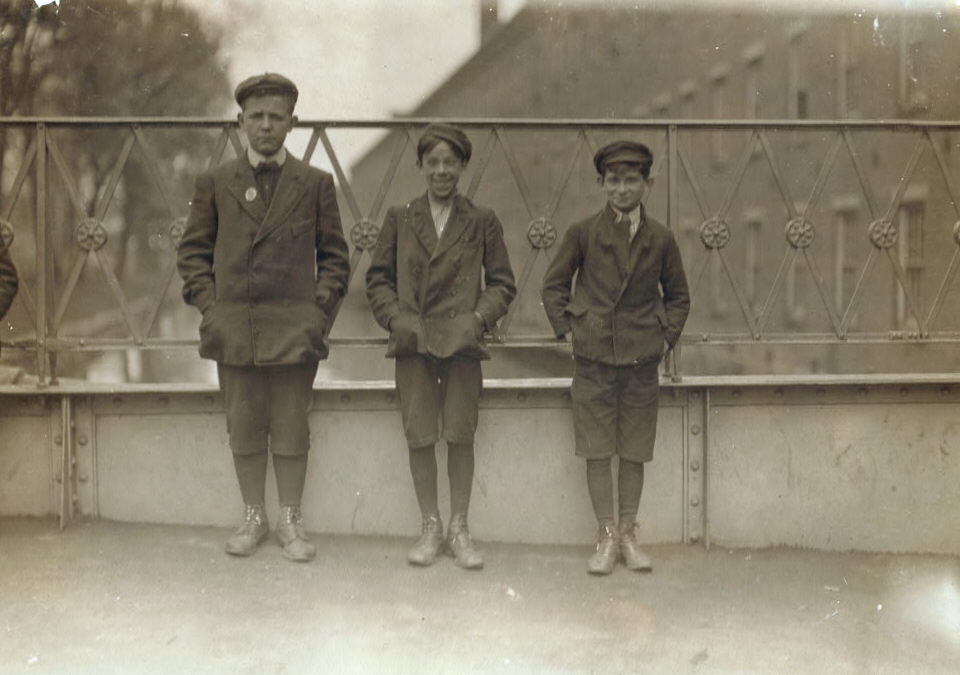
Lewis Hine caption: Boys working in Amoskeag Mills, Manchester, N.H. Smallest boy is Napoleon Cammery, 194 Merrimac St. Been in mill 1 year. Next boy is Jerry Moore, 352 Chestnut St. Martin Markey, 33 State St. Location: Manchester, New Hampshire, May 1909.
“My father always bought an Irish Sweepstakes ticket. He never won the top prize, but one time, he won $500, which was a lot of money back then. They took my father’s picture with my brother Marty and me, and they put it on the front page of the paper.” -Sister Monica Markey, daughter of Martin Markey
This is the first of my stories about the three boys in this photo. Links to the other two stories are at the bottom of this page.
I found Martin Markey’s death record right away in the Social Security Death Index. But the death record listed only that he died in Manchester in April of 1977, and did not give the date of the month. Consequently, I was unable to get the Manchester City Library to look up the obituary. So I did the next best thing: I called up all the Markeys listed in Manchester, and one of them, a distant relative, directed me to Martin’s daughter, Sister Monica Markey, of Dover, NH. I called her, and she was both surprised and delighted that her father’s picture is in the Library of Congress.
Martin Francis Markey was born in Manchester, New Hampshire, on December 16, 1894. His parents were Owen and Ellen (Regan) Markey, who were married in 1894. Both were Irish immigrants. It was Owen’s third marriage, his first two wives having passed away. He worked at Amoskeag. In the 1900 census, the family was living at 161 Cedar St, less than a mile east of the mill. In 1910, they were living at 33 State St, a boarding house that was managed by Martin’s mother. It was just a short walk from the mill. Martin was listed as a mill worker.
In 1917, Martin’s WWI draft registration card listed him as living in Butte, Montana, where he worked in a silver mine. He stated, “one eye very bad.” That is explained in my interview with his daughter. In 1920, he was back in Manchester, at 252 Bell St, living with his parents and working in the mill. In 1930, he was living with his wife and three children, in his widowed father’s home, still at 252 Bell St. Martin was working for the Manchester Gas Company, where he was still working in 1942, according to his WWII draft registration. He passed away on December 12, 1955, four days before his 60th birthday.
Edited interview with Sr. Monica Markey (MM), daughter of Martin Markey. Conducted by Joe Manning (JM), on December 10, 2008. Transcribed by Hilary Buxton and edited by Manning.
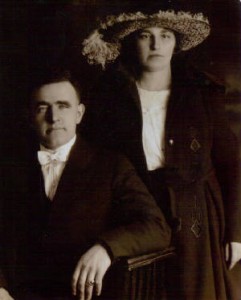
JM: Were you surprised at the photograph?
MM: I recognized my father right away because I had a brother, Martin, who passed away from juvenile diabetes when he was young. He looked just like my father.
JM: Did you know that he worked at that age?
MM: No, I didn’t. I don’t remember him talking about working in the mills.
JM: What were his parents’ names?
MM: Their names were Owen Markey and Ellen Regan Markey. When my grandfather Owen came from Ireland, he settled in Dover (New Hampshire) – strange thing that I live in Dover now. He worked in a mill, married and had four children. His wife died when the children were young. So he married again, and they had two children, but they got influenza, and the mother and the two children died. It was a real blow for my grandfather. He took the four children from his first marriage and went to Manchester, worked at Amoskeag, married again, to Ellen, and had two more children, including my father.
JM: How long did you know your grandfather?
MM: I was only two or three years old when he died. My grandparents lived in Hookset (near Manchester), and my grandmother ran a boarding house down by the Amoskeag Mills. She came to Manchester every morning very early. My grandfather helped her, but he also worked in the mill. She had 26 boarders, and she would make them breakfast, give them some lunch, and then serve them dinner, and then she would go back home. They built a house on Belt Street in Manchester and rented out the three apartments. My grandmother died when she was fairly young, and when my grandfather retired, he lived in that home until he died.
JM: What year were you born?
MM: I was born in 1930, one of six children, three boys and three girls.
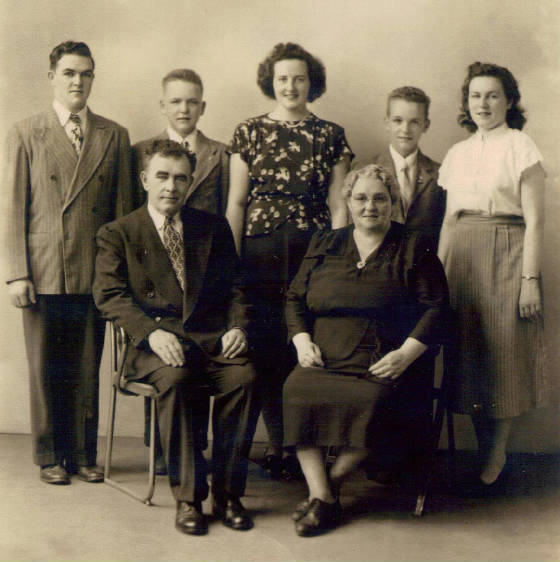
JM: What was your mother’s name?
MM: My mother’s name was Mary McAndrew. She was an immigrant from Ireland.
JM: Did she work when you were growing up?
MM: No, she stayed home.
JM: Where did your father work when you were growing up?
MM: He had a job with the gas company in Manchester.
JM: What was he doing for them?
MM: I think he worked in the plant. When my father was a young man, he went to Butte, Montana, and he worked out there for a little while. I think he worked in the mines. When he was there, some gentleman was lighting his cigarette, and when he struck the match, a piece of something went into my father’s eye, and my father always had very little sight in that eye afterward. That’s why he didn’t enter the service in World War II. And he never drove a car.
JM: Where were your parents living when you were born?
MM: On Bell Street, in the home that my grandparents built. All the children were born on Bell Street. My parents were married on November 8, 1921, at St. Raphael’s Church. The reception was held at the home on Bell Street. I don’t know how they got 75 people in there. It was in the newspaper, and I still have a copy of the article. After they were married, my mother and father went to New York, where my father had a job with the Edison Company. They stayed there until my grandmother became ill, so my father and mother came back and lived in the family home. After my grandmother died, my mother took care of my grandfather until he died, and my father worked for the gas company.
JM: How old was your father when he died?
MM: He was 60. He died on the 12th of December, and he was buried on his 61st birthday, the 16th of December. His health was affected by working for the gas company. The gas would go into his lungs, and that was not good. He had to leave when he was in his 50s.
JM: So what did he do then? Did he completely retire?
MM: He owned a restaurant for a while. It was on Central Street. He sold beer on tap and served sandwiches. This was back in the late 1940s. He opened the restaurant with a friend – his best friend for years.
JM: What did he do after that?
MM: He was very close to his brother John, who lived in New York. Uncle John had a restaurant in Brooklyn, and my father lived with him and helped him in the restaurant. They went up to Greenwood Lake in New York, where Uncle John owned a rooming house. But my father was not well, so he came back about a year later.
JM: What kind of personality did your father have?
MM: He was very well liked, but he was a quiet man. He liked to read. He and my mother always had lots of friends. He enjoyed life. I remember that we were one of the first ones on the street to have a radio. His friends from the neighborhood would come in and listen to the programs.
JM: Were you in an Irish neighborhood?
MM: There were many Irish, but there were also many French and many Greeks. It was the Greeks, the Irish and the French on our side of the river (Merrimac River). The Germans were on the other side of the river, along with some French and Irish, but the Irish dominated our neighborhood. The neighbors were like family to us.
JM: Were most of the houses on your street multi-family houses?
MM: Yes, they were tenements, all of them, but it was a wonderful street. One of our neighbors was John King, who was governor of New Hampshire for 8 years.
JM: When did you decide to become a nun?
MM: Sixty years ago, when I was 17 and in high school. I retired when I was 70, and then I did four years of subbing in a public school, and now I do volunteer work here in Dover. My oldest sister also became a nun. She was a nun almost 60 years before she died. My sister Mary, who worked in public service for years, never married, and stayed at home. My brother Marty died at age 45.
JM: Was there some particular thing that you loved to do with your father?
MM: We went to Hampton Beach in the summer. The bus would take us down on Sundays. My dad was such a wonderful father, and my mother was a saint. She was a wonderful woman, and a great cook. We all sat down for dinner every night of the week. Sundays were a big thing. Sometimes our cousin, Jimmy Laughlin, who lived here in Dover, would come over. Jimmy and my father were best friends. Uncle John would come, too. They were all very close.
JM: You said your father couldn’t drive, so did your mother do all the driving?
MM: She never drove.
JM: So nobody ever went anywhere in the car?
MM: My father and mother would go shopping once a week. They would take the bus to the First National (food market) on Elm Street, and then they would hire a taxi and come home. We didn’t have a car until my sister Mary got her license.
JM: When did your mother die?
MM: She died in 1965, ten years after my father died. Want to hear something? My father died the 12th of December, my mother died on the 12th of September, my brother Marty died the 12th of April, my sister Marina died the 12th of July, and my sister Mary died on the 24th of June.
JM: Tell me more about your father.
MM: I can see him sitting in the kitchen with one boy on each knee. That’s the kind of man he was, you know, we would all sit down in the same room or around the table. We didn’t have a car, but we always had a good home and good clothes and good food. We were blessed. My father always bought an Irish Sweepstakes ticket. He never won the top prize, but one time, he won $500, which was a lot of money back then. They took my father’s picture with my brother Marty and me, and they put it on the front page of the paper.
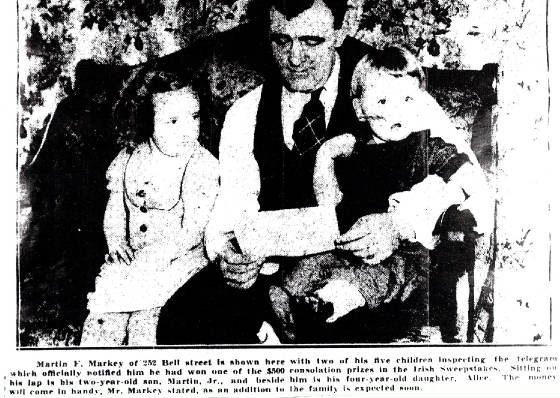
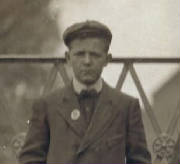
Martin Markey: 1894 – 1955
*Story published in 2010.